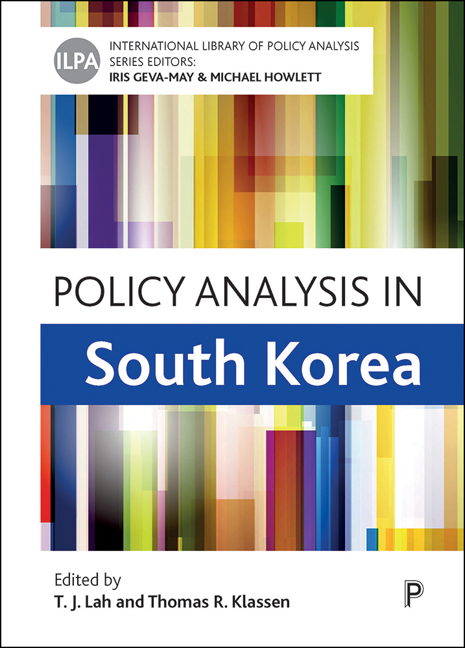Book contents
- Frontmatter
- Dedication
- Contents
- List of figures, tables and boxes
- List of abbreviations
- Notes on contributors
- Acknowledgements
- Editors’ introduction to the series
- Foreword
- Part One Overview of policy analysis in Korea
- Part Two Policy analysis by governments
- Part Three Committees, consultants, media, public inquiries and public opinion
- Part Four Parties, interest groups and advocacy-based policy analysis
- Part Five Academia, research institutes and policy analysis
- Index
three - The policy analysis profession in Korea
Published online by Cambridge University Press: 18 January 2024
- Frontmatter
- Dedication
- Contents
- List of figures, tables and boxes
- List of abbreviations
- Notes on contributors
- Acknowledgements
- Editors’ introduction to the series
- Foreword
- Part One Overview of policy analysis in Korea
- Part Two Policy analysis by governments
- Part Three Committees, consultants, media, public inquiries and public opinion
- Part Four Parties, interest groups and advocacy-based policy analysis
- Part Five Academia, research institutes and policy analysis
- Index
Summary
Introduction
The greater diversity and complexity of policy issues across societies in politics, economics and culture can be confirmed by the increase in volume of legislation and policy analysis reports and the greater numbers of staff that support the policy process professionally. In response to these changes, the role of policy analysis is becoming more critical in promoting rational policymaking and systematic implementation in the policy process. This chapter will provide a brief review of the history of the policy analysis profession in Korea, the realities of the profession and the requirements for future policy analysts in term of professional qualifications.
The policy analysis profession played a critical role in formulating modernised national systems in Korea in the early 1960s. This was mainly driven by military elites and technocrats who were well versed in economics in particular. This tradition has lasted for several decades, although some parts of the roles and responsibilities have been shared by policy analysis professionals from other sectors such as academia, political parties and non-governmental organisations (NGOs). Policy analysis was first recognised as an independent, and arguably most critical element of the policy process, in 1980, and it is now utilised in a much broader realm of public decision making than one might think.
In this chapter we provide a brief history of the policy analysis profession in Korea, then shift to discussing how policy analysts with backgrounds in both academia and applied policy analysis addressed their mission to assist in shaping better public policy. We further provide an overview of the realities of how policy analysis professionals meet stakeholder expectations and address the challenges they face. Finally, we attempt to lay out the qualifications required for those who desire to become a policy analyst in terms of education, communication skills and ethics.
A brief history of the policy analysis profession in Korea
The policy analysis profession first emerged in Korea in the early 1960s, when analysts played a critical role in formulating modernised national systems. This was mainly driven by military elites and technocrats with a background in economics. This period saw the advent of the tradition where the central government formulates the national development agenda and allocates limited resources to highly efficient public and private sector projects.
- Type
- Chapter
- Information
- Policy Analysis in South Korea , pp. 25 - 36Publisher: Bristol University PressPrint publication year: 2023

